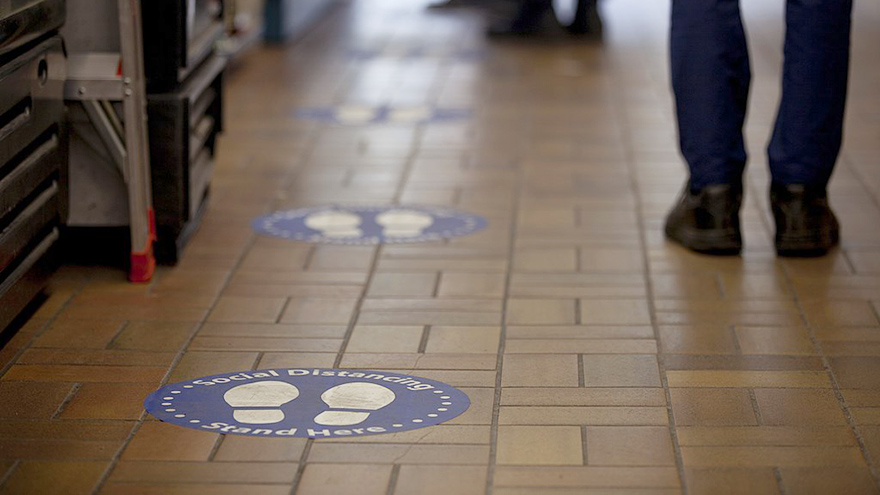Global governance: planning for the world after COVID-19
The world could be yet more divided, conflictual and nationalistic.

After COVID-19 there is a risk the world could be yet more divided, conflictual and nationalistic. But an alternative scenario is within reach. In this scenario, collective action within communities and, where necessary, internationally, will make a more rapid and peaceful exit from the crisis possible.

The high-risk scenario
Politics could turn toxic as governments fail or struggle to
speedily control the pandemic, to ease lockdowns safely, or to communicate
clearly about what they are doing and why. Some politicians will resort to a
discourse combining fear and tribalism. This will exacerbate discrimination at
home – as seen in parts of the USA,
China,
and India
– and jingoistic nationalism will also make international cooperation more
difficult.
Failure to cooperate internationally will hinder the fight
against the virus. Closing down trade, requisitioning materials, or preventing
supply to other nations will hobble everyone’s capacity to source adequate testing
and treatment materials. The closing of borders and ripping up of international
rules will make it ever more difficult to restart trade and travel, and extend
the lockdown, heightening anger and anxiety.
The crisis has exposed how many people, even in some of the
world’s richest countries, live in
inadequate housing, without reserves of cash or food, and face difficulties in accessing
government assistance. The global lockdown is exacting an enormous
price from them. They will demand better, having seen the enormous sums
governments have mobilized to deal with the crisis.
However, not all governments will be able to deliver.
Governments will face gigantic debts. Many households and business were already heavily indebted before the crisis. Some will be able to raise funding through the capital markets (the UK borrowed £45 billion in one month). Others will face ruinous rates for borrowing (South Africa has had its credit rating reduced to junk status). Investors will look for robust investment plans, competent leadership, and robust institutions. Most developing countries will be excluded. In short, a financial crisis is in the offing and without international cooperation, beggar-thy-neighbour policies are likely to deepen economic recession for all.
Finally, sabre-rattling and war offer a diversion for
politicians facing political and economic turmoil at home. Building on their
jingoistic nationalism, there is a risk that some will seek to focus the anger
and frustration of their citizens on another country. Already we are seeing
political leaders blame
other countries for their own failings including for problems before the
crisis.
One scenario for the post-COVID-19 world has political and economic forces fuelling fear and conflict, deepening economic damage, eviscerating the possibility of growing out of the crisis and exacerbating divisions that the pandemic is already revealing.
A better scenario
The world has managed extreme conditions before. Leaders of
the 1940s reflected on their failure to cooperate after the First World War,
how it drove the world into economic catastrophe (the Great Depression) and
conflict (the Second World War), and resolved to do better. They started
planning during the war. They knew that cooperation would be essential to
rebuild afterwards and to redevelop a global economy within which each country
could grow. So, too, global leaders must begin to plan post-pandemic cooperation.
Three tasks that confronted those leaders have their parallel today. First and most immediate is to fight the common enemy – now the virus – together. The second is political and geo-political: Churchill, Roosevelt and Stalin had to fashion a world that could accommodate their own (and others’) diverse political regimes. The third task is economic. Economic reconstruction had to deal with massive government debts and a broken global trading and investment system.
Fighting the virus together requires cooperation on three
things: research and knowledge (working together to understand and beat the
virus); maintaining global supply (trade ensuring efficient global supply of
necessary materials); and warning of future outbreaks. This might sound easy.
It is very difficult. Why would a scientist share crucial data with others, or
a country continue to export protective equipment if they are not sure that
other countries will reciprocate? Why warn of a disease outbreak if you think
that other countries will slam the door on you?
For cooperation to work, countries need to agree common
rules and empower an institution to oversee them. The World Health Organization
(WHO) exists to do this, but it is overstretched and underfunded. It needs to
be properly funded to do its job. Its current budget is about equal to that of
one large US hospital, and 83% of it is “voluntary” contributions which are
tagged for special projects. It also needs governments to hear and follow its
advice. Since 4 January 2020, the WHO has shared information about the
outbreak, providing technical advice and guidance, and emphasising the need to
test, trace, and isolate in order to contain the virus. Some major countries
ignored the warnings and the advice.
There has, however, been cooperation among scientists from
China, the US, Europe, and among businesses
(e.g., GSK team-up with AstraZeneca). Some of that cooperation was facilitated by
the WHO, whose technical guidance and advice has been taken up by many
countries. Although there have been export controls, Germany has flown Italian
patients into its hospitals, and China sent ventilators and protective
equipment to other countries. In Latin
America, efforts are being made to keep borders open while fighting the
virus together. several countries are working together. The key thing now is to
tilt this mixture further in the direction of cooperation. The WHO must be
supported, financed, and empowered to do everything possible to point the world
towards a virtuous circle of mutual trust and away from a vicious cycle of
dog-eat-dog.
Improving politics
Diverse political regimes must work together in the world after COVID-19. People have been quick to conclude victory either for autocracy or democracy in this crisis. Democracy has been criticised for popularity-seeking instead of pursuing technically sound policies. Autocracy has been criticised for repression. But more humble lessons need to be learned all round.
Politicians in any system can be tempted to take popular
rather than necessary decisions. Consider democratic neighbours Sweden and
Denmark: Sweden with far less of a lockdown early on has ended up with a much
higher death rate. Similarly, Wuhan authorities played down news of the virus,
and went ahead with their Baibuting mass banquet on 9 February, to disastrous
effect. Poor leadership results in bad outcomes, whatever the political system.
Perhaps alternative centres of power – at local or city
level – can offer insurance, and a quicker way to get things done. National
leaders in the United States and Brazil were slow to take the pandemic
seriously but governors at the state level stepped up (albeit not resolving the
need for coordination from the centre). In China, the crisis exposed the overly
politicised accountability of local government officials in Wuhan. In Italy,
mayors have stepped in to enforce what they describe as slightly confusing
national messages. The UK government was slow to mobilize an existing network
of local environmental health officers to trace contacts. All governments could
do better by balancing autonomy and agility at the local level with national
level coordination.
It has become too easy for extremists to rattle sabres across social media. But jingoism and talk of war will not resolve the core problems facing the United States or China, nor any other country in the world. Government leaders facing an enormous challenge at home need to focus their energies and efforts and agree to disagree with some foreigners, yet also make a powerful new case to their citizens about cooperation. They must provide security at home, and as its necessary correlate, cooperation abroad.
Reconstruction
Economic reconstruction is the third challenge. After the Second
World War, war-torn countries were desperate to get their economies restarted.
Debts had to be written down. New flows of investment had to be found. The
result was a massive reset delivering mass housing, health, employment and
education. This may not be possible in 2020, but some changes occurring during
the crisis could be built upon.
Increased solidarity is visible across societies, as they
seek to attenuate the effects of the lockdown. In Nigeria
citizen-powered welfare organizations and tech companies are stepping up to
feed the poor. In the United Kingdom,
high-end restaurants have stepped in to offer meals to hospital workers in the
national health service. In China,
volunteers made their way to Wuhan to help at the height of the crisis. In France,
those who have lost their jobs in the cities are being encouraged to go to the
countryside to help farmers harvest produce. Across Europe people have made a
regular feature of singing and applauding the newly recognised “key workers” (nurses,
carers, doctors, firefighters, rubbish collectors, and supermarket checkout
operators) most of whom are low paid, and many immigrants. Communities are
standing together, albeit at a physical distance.
To build on emerging solidarity will take very careful and representative leadership. Global discussions float big ideas – “sustainable development goals”, “stakeholder capitalism”, etc. - but the onus is on the proponents of these ideas to translate them into feasible steps which will help governments rebuild at a national level after the crisis.
At the international level, two lessons from the post-war
settlement stand out. The first is the need for debt write-downs to enable
countries to grow out of the crisis. Packages and efforts to reduce the debt
loads of development countries announced by the International Monetary Fund (IMF)
and World Bank now need support from countries robust enough to tap into bond
markets and share the benefits of their credit-worthiness (through the
credit-pooling arrangements of multilaterals). The second lesson is that major
producers will need to invest in growth in their own future markets in other
countries. Post-war America did this. In today’s world, the United States,
China and Europe will have to do the same.
The post-COVID world will be shaped by decisions being made in the crucible of the fight against the virus. The profound uncertainty about the virus and its trajectory, and about how other countries will respond, only magnifies the importance of leadership. At the very least, leaders across the world must cooperate to fight against the virus, collectively eliminating it. They must do so without being distracted by political differences, but by focusing on the extraordinary challenges that lie within their own borders. They must make the case to their citizens that security at home requires cooperation abroad. And finally, those that can will need to invest in neighbours and in poorer parts of the world, for only together will their economies flourish.
Professor Ngaire Woods is Dean of the Blavatnik School of Government, University of Oxford.
This essay is the opening chapter of the World Economic Forum's publication Challenges and Opportunities in the Post-COVID-19 World, published on 19 May 2020.

